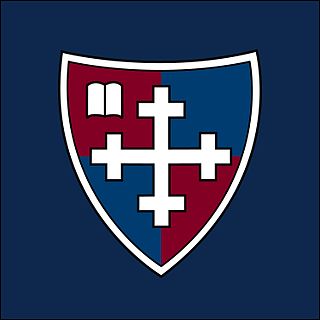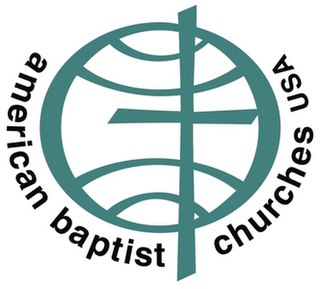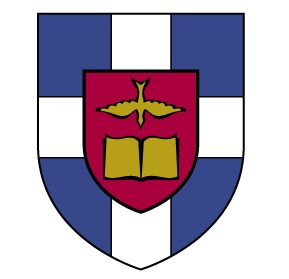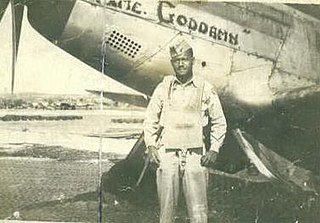
Gordon–Conwell Theological Seminary (GCTS) is an evangelical seminary with its main campus in Hamilton, Massachusetts, and three other campuses in Boston, Massachusetts; Charlotte, North Carolina; and Jacksonville, Florida. According to the Association of Theological Schools, Gordon-Conwell ranks as one of the largest evangelical seminaries in North America in terms of total number of full-time students enrolled.

The American Baptist Churches USA (ABCUSA) is a Baptist Christian denomination established in 1907 originally as the Northern Baptist Convention, and from 1950 to 1972 as the American Baptist Convention. It traces its history to the First Baptist Church in America (1638) and the Baptist congregational associations which organized the Triennial Convention in 1814. Headquartered in Valley Forge, Pennsylvania, ABCUSA is usually considered mainline, although varying theological and mission emphases may be found among its congregations, including modernist, charismatic and evangelical orientations.

The National Baptist Convention of America International, Inc., more commonly known as the National Baptist Convention of America or sometimes the Boyd Convention, is a Christian denomination based in the United States. It is a predominantly African-American Baptist denomination, and is headquartered in Louisville, Kentucky. The National Baptist Convention of America has members in the United States, Canada, the Caribbean, and Africa. The current president of the National Baptist Convention of America is Dr. Samuel C. Tolbert Jr. of Lake Charles, Louisiana.

The Southwestern Baptist Theological Seminary is a Baptist theological institute in Fort Worth, Texas. It is affiliated with the Southern Baptist Convention. It was established in 1908 and in 2005 was one of the largest seminaries in the world. It is accredited by the Association of Theological Schools in the United States and Canada, the Southern Association of Colleges and Schools Commission on Colleges, and the National Association of Schools of Music to award diplomas and bachelor's, master's, and doctoral degrees.

Robert Russa Moton was an American educator and author. He served as an administrator at Hampton Institute. In 1915 he was named principal of Tuskegee Institute, after the death of founder Booker T. Washington, a position he held for 20 years until retirement in 1935.
Dr. Vernon Johns was an American minister based in the South and a pioneer in the civil rights movement. He is best known as the pastor (1947–52) of the Dexter Avenue Baptist Church in Montgomery, Alabama. He was succeeded there by Dr. Martin Luther King Jr.

William J. Simmons was a formerly enslaved person who became the second president of Simmons College of Kentucky (1880–1890), for whom the school was later named.

The Southern Baptist Theological Seminary (SBTS) is a Baptist theological institute in Louisville, Kentucky. It is affiliated with the Southern Baptist Convention. The seminary was founded in 1859 in Greenville, South Carolina, where it was at first housed on the campus of Furman University. The seminary has been an innovator in theological education, establishing one of the first Ph.D. programs in religion in the year 1892. After being closed during the Civil War, it moved in 1877 to a newly built campus in downtown Louisville and moved to its current location in 1926 in the Crescent Hill neighborhood. In 1953, Southern became one of the few seminaries to offer a full, accredited degree course in church music. For more than fifty years Southern has been one of the world's largest theological seminaries, with an FTE enrollment of over 3,300 students in 2015.
Gardner Calvin Taylor was an American Baptist preacher. He became known as "the dean of American preaching".

Suzan Denise Johnson Cook is a U.S. presidential advisor, pastor, theologian, author, activist, and academic who served as the United States Ambassador-at-Large for International Religious Freedom from April 2011 to October 2013. She has served as a policy advisor to President Bill Clinton and later to the Secretary of Housing and Urban Development Henry Cisneros, a dean and professor of communications at Harvard University, a professor of theology at New York Theological Seminary, a pastor at a number of churches, a television producer, and the author of nearly a dozen books. She was the first female senior pastor in the 200-year history of the Mariners Temple Baptist Church in NYC part of the American Baptist Churches USA and a close friend of Coretta Scott King. She is an honorary member of Delta Sigma Theta sorority.
Jerry Alexander Moore Jr. was an African-American Baptist minister and politician in Washington, D.C.
Marion Mann was an American physician and pathologist. He was a Dean of the College of Medicine at Howard University from 1970 to 1979.

William Bullein Johnson was an American Baptist minister, one of the founders of the South Carolina State Baptist Convention in 1821, and later was the first president of the Southern Baptist Convention from 1845 to 1851. Johnson is also the founder of Johnson Female Seminary, later renamed Johnson University, in 1848 the predecessor to Anderson University.

The Heritage College & Seminary is a Baptist theological institute in Cambridge, Ontario, Canada. It is affiliated with the Fellowship of Evangelical Baptist Churches in Canada.

Samuel Harrison Greene was an American Baptist pastor, church leader, and university official.

The Nineteenth Street Baptist Church, located on 16th Street, NW, is considered to be the first and oldest Baptist, black congregation in Washington, D.C. Since its founding in 1839, the church has figured prominently within the historical and social fabric of Washington, D.C.'s African American community.
Paul Smith is an American Presbyterian minister, mediator and civil rights activist known for creating multi-racial churches in Buffalo, St. Louis, Atlanta and Brooklyn, NY. Smith has been active in the civil rights movement since the 1950s. He has been an administrator, faculty member and trustee at seminaries and universities in St. Louis, Atlanta and New York City. He has served as a mediator and multicultural consultant to corporations and the government and has been active in organizations like the Urban League.

Jennie B. Moton (1879-1942) was an American educator and clubwoman. As a special field agent for the Agricultural Adjustment Administration (AAA) in the 1930s and 40s, she worked to improve the lives of rural African Americans in the South. She directed the department of Women's Industries at the Tuskegee Institute, presided over the Tuskegee Woman's Club, and was a two-term president of the National Association of Colored Women (NACW).

John Andrew Kenney Sr. was an African-American surgeon who was the medical director and chief surgeon of the John A. Andrew Memorial Hospital at the Tuskegee Institute in Tuskegee, Alabama, from 1902 to 1922. He served as secretary of the National Medical Association (NMA) from 1904 to 1912, and was elected president of the NMA in 1912. He was the editor-in-chief of its journal, the Journal of the National Medical Association, from 1916 to 1948. He also served as the personal physician of both Booker T. Washington and George Washington Carver.

Rutherford Hamlet "Lubby" Adkins was an American military aviator and university administrator who served with the Tuskegee Airmen during World War II. He flew fourteen combat missions with the Tuskegee Airmen. He came home to complete his education and earn multiple degrees: he was the first African American to earn a PhD from The Catholic University in Washington D.C. Adkins went on to serve in many positions in higher education including as President of Knoxville College and Fisk University.














